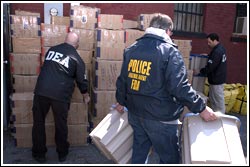Main Content
Lesson 2: Police History and the Organization of Public and Private Security in the United States
Organizing Public and Private Security in the United States
Local v. National Control
Many know the adage "all politics is local." Policing in the United States is viewed similarly, accounting for why this country has more than 18,000 full-time police and law enforcement agencies. The vast majority of these are local police departments with fewer than 50 sworn personnel. The majority of the uniformed officers are engaged in patrol work, while fewer than 20 percent are assigned as full-time investigators.
The most recognized of federal law enforcement agencies are the U. S. Department of Justice; Department of Treasury; Department of Homeland Security; Department of the Interior; Federal Bureau of Investigation, Drug Enforcement Administration; U.S. Marshals Service; Internal Revenue Service; Bureau of Alcohol, Tobacco, Firearms, and Explosives; National Park Service; U.S. Capitol Police; U.S. Postal Inspectors; and the U.S. Department of Diplomatic Security.
Private Security
In the past 25 years, the private security industry has grown tremendously. In 2003, persons in the contract and proprietary security industry held 1.1 million jobs. This field spans from security guards to armored car services to security consultants and engineers. Private investigation agencies such as The Pinkertons and Wackenhut are also major employers in the field.
Only recently has there been a demonstration as to how far privitatization has progressed into policing and law enforcement. Edward Snowden leaked details of the National Security Administration’s (NSA) surveillance program. Contrary to the beliefs of many, Snowden was not an employee of the U.S. Government but worked for Booz Allen Hamilton, a private contractor. Both the Clinton and Bush administrations touted how they had reduced the size of governement workers. However, they failed to inform the public that these same jobs had been contracted out to priviate industry at an increased cost.
